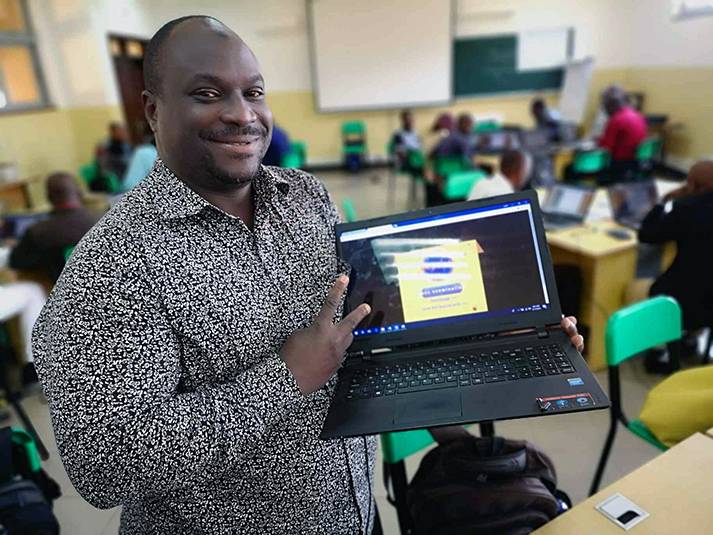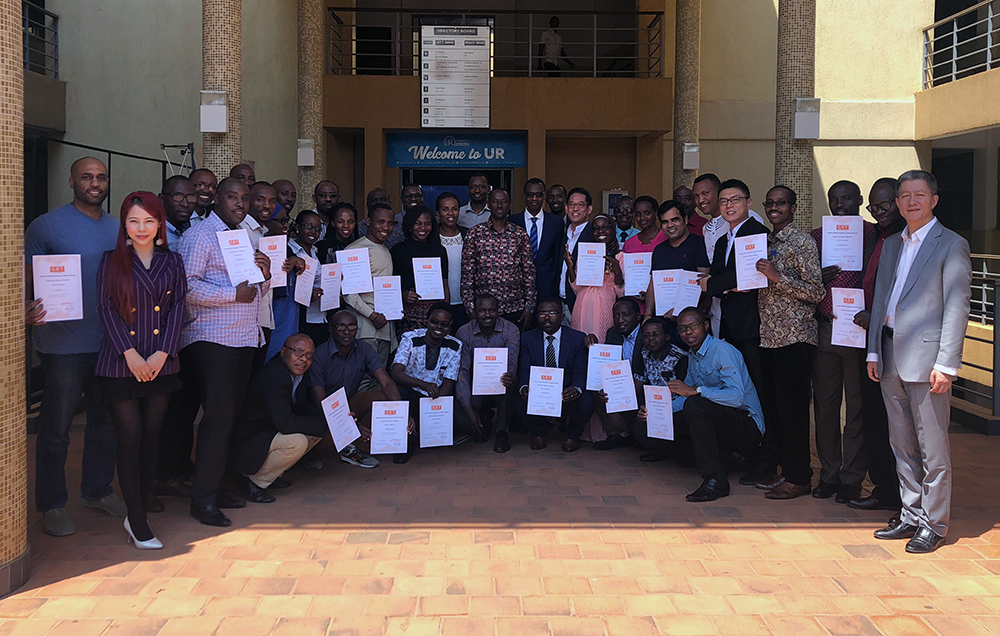


Alibaba Business School continued its push to train the next generation of global entrepreneurs last week with a program tailored to educators in Rwanda.
Called the “Global E-commerce Talent – Train the Trainers” program, the weeklong course covered topics from the digital economy and forming a company to risk management and acquiring customers. Alibaba has brought the GET program to other countries, such as Malaysia and Thailand, but this was the first time it was offered in Africa.
The goal of the program is to boost the competencies of Rwandan university teachers and deepen their understanding of the e-commerce industry, so that they can train digital talent and future entrepreneurs in the country to compete in the global economy.
Alibaba Business School partnered with the Ministry of Education’s Higher Education Council and the Rwanda Development Board on the initiative, which was hosted by the University of Rwanda. Fifty lecturers from nine of the country’s top universities attended the training.
“As the inaugural GET training for Africa, we are grateful for the Rwandan government’s trust in the value that Alibaba Business School brings to its students and the local entrepreneurs,” said Alibaba Global Initiatives Vice President Brian Wong, who represented Alibaba Business School in Rwanda.
“Our goal is to support the development of e-commerce education, nurture skill sets that will accelerate Rwanda’s vision to become the digital hub of Africa and foster a generation of talented and passionate young entrepreneurs who can help bring new innovation, create job opportunities and transform the global commerce landscape in the country,” Wong said.



The GET program is the first piece of a broader cooperation to bring the Electronic World Trade Platform initiative to Rwanda. The eWTP is a multi-stakeholder initiative that seeks to make it easier for small and medium-sized enterprises to participate in global trade and contribute to the development of the digital economy. The idea was pioneered by Jack Ma and gained recognition by the Group of 20 nations, the United Nations Industrial Development Organization and countries such as Malaysia and Belgium. During a meeting in Davos last January, Ma and Rwandan President Paul Kagame agreed to launch eWTP in Africa for the first time. A formal announcement about the initiative in Rwanda, which will include capacity building, e-commerce and tourism, is expected “soon,” Alibaba said.
Diane Sayinzoga, the head of Rwanda’s Special Economic Zone and Exports Department, said the training would help to ensure the development of a sustainable e-commerce ecosystem in the country and support the growth of small businesses.
“The GET program in Rwanda is one of the key components of the eWTP Rwanda project,” Sayinzoga said. “We believe that those students, once they graduate, they will play a key role in supporting SMEs involved in e-commerce.”
In addition to teaching the fundamentals of running a digital business, the GET program offered insights into doing business with China, whether using Alibaba.com, Tmall or Taobao or marketing directly to Chinese consumers. Instructors, all expert trainers with extensive e-commerce business experience from Alibaba’s ecosystem, taught participants how to best position their products in the China market and even how to write a good product description.
The GET program will play a part in fostering the entrepreneurship necessary to reach Rwanda’s goal of creating 200,000 jobs by 2020, Emmanuel Muvunyi, executive director of the Higher Education Council, said.
“We hope that the practical ecommerce knowledge from the GET program will inspire and equip our students to explore opportunities for doing business by leveraging technology to tackle challenges creatively and help Rwandan SME’s to tap into the global market,” Muvunyi said.
Faculty from African Leadership University, a school that focuses its curriculum on technology, entrepreneurship and international business, took part in the training. Gaidi Faraj, ALU’s dean of faculty and academic affairs, said he plans to integrate the skills taught during the GET program into classes currently being taught at the school, as well as create a new course that focuses solely on e-commerce.
“As an innovative institution that focuses on creating entrepreneurial leaders, being able to include e-commerce in our curriculum allows us to equip our students with the latest tools and knowledge to make them competitive on a global scale,” Faraj said.
“E-commerce is a great equalizer because anyone anywhere in the world can participate in the global economy,” he said.
Alibaba’s connection to Rwanda began when founder and Executive Chairman Jack Ma made his first trip to Africa last summer, meeting Rwandan President Paul Kagame in the capital city of Kigali in addition to a stop in Kenya.
During that trip, Ma pledged to work with African universities and governments to create training programs for e-commerce, payments, logistics and analytics, which he said are critical skills for doing business in the digital age. That pledge prompted the training this week in Rwanda.
Ma also said he would create a training program, in partnership with the United Nations Conference on Trade and Development, and invite 200 young African entrepreneurs to Alibaba’s campus in Hanghzou to study e-commerce. They would then return to Africa to develop e-businesses and as well as teach those to other young, aspiring business owners there.
The initiative is part of a larger eFounders Fellowship designed to promote global youth entrepreneurship in developing countries. So far, 52 fellows from Africa and 37 fromSoutheast Asia and Pakistanhave completed the program since theinaugural class last November.
Five entrepreneurs from Rwanda have participated in the eFounders Fellowship program. They shared their experience in building businesses, and their time in China, during last week’s GET program.





